The Red Feast - Gav Thorpe Read online
BACKLIST
More great stories from the Age of Sigmar
SACROSANCT AND OTHER STORIES
Various authors
SOUL WARS
Josh Reynolds
THE REALMGATE WARS: VOLUME 1
Various authors
Contains the novels The Gates of Azyr, War Storm, Ghal Maraz, Hammers of Sigmar, Wardens of the Everqueen and Black Rift
THE REALMGATE WARS: VOLUME 2
Various authors
Contains the novels Call of Archaon, Warbeast, Fury of Gork, Bladestorm, Mortarch of Night and Lord of Undeath
GODS AND MORTALS
Various authors
SCOURGE OF FATE
Robbie MacNiven
• HALLOWED KNIGHTS •
Josh Reynolds
Book 1: PLAGUE GARDEN
Book 2: BLACK PYRAMID
HAMILCAR: CHAMPION OF THE GODS
David Guymer
BLACKTALON: FIRST MARK
Andy Clark
SHADESPIRE: THE MIRRORED CITY
Josh Reynolds
CALLIS & TOLL: THE SILVER SHARD
Nick Horth
THE TAINTED HEART
C L Werner
NEFERATA: MORTARCH OF BLOOD
David Annandale
OVERLORDS OF THE IRON DRAGON
C L Werner
EIGHT LAMENTATIONS: SPEAR OF SHADOWS
An Age of Sigmar novel
NAGASH: THE UNDYING KING
Josh Reynolds
THE RED HOURS
Evan Dicken
HEART OF WINTER
Nick Horth
WARQUEEN
Darius Hinks
THE BONE DESERT
Robbie MacNiven
~ AUDIO DRAMAS ~
REALMSLAYER
David Guymer
EIGHT LAMENTATIONS: WAR-CLAW
Josh Reynolds
SHADESPIRE: THE DARKNESS IN THE GLASS
Various authors
THE PALACE OF MEMORY
Various authors
THE DENIED
Josh Reynolds
GUNS OF THE BLACK EAGLE
C L Werner
THE PRISONER OF THE BLACK SUN
Josh Reynolds
SANDS OF BLOOD
Josh Reynolds
THE LORDS OF HELSTONE
Josh Reynolds
THE BRIDGE OF SEVEN SORROWS
Josh Reynolds
THE BEASTS OF CARTHA
David Guymer
FIST OF MORK, FIST OF GORK
David Guymer
GREAT RED
David Guymer
ONLY THE FAITHFUL
David Guymer
CONTENTS
Cover
Backlist
Title Page
Warhammer Age of Sigmar
Chapter One
Chapter Two
Chapter Three
Chapter Four
Chapter Five
Chapter Six
Chapter Seven
Chapter Eight
Chapter Nine
Chapter Ten
Chapter Eleven
Chapter Twelve
Chapter Thirteen
Chapter Fourteen
Chapter Fifteen
Chapter Sixteen
Chapter Seventeen
Chapter Eighteen
Chapter Nineteen
Chapter Twenty
Chapter Twenty-One
Chapter Twenty-Two
Chapter Twenty-Three
Chapter Twenty-Four
About the Author
An Extract from ‘Scourge of Fate’
A Black Library Publication
eBook license
From the maelstrom of a sundered world, the Eight Realms were born. The formless and the divine exploded into life.
Strange, new worlds appeared in the firmament, each one gilded with spirits, gods and men. Noblest of the gods was Sigmar. For years beyond reckoning he illuminated the realms, wreathed in light and majesty as he carved out his reign. His strength was the power of thunder. His wisdom was infinite. Mortal and immortal alike kneeled before his lofty throne. Great empires rose and, for a while, treachery was banished. Sigmar claimed the land and sky as his own and ruled over a glorious age of myth.
But cruelty is tenacious. As had been foreseen, the great alliance of gods and men tore itself apart. Myth and legend crumbled into Chaos. Darkness flooded the realms. Torture, slavery and fear replaced the glory that came before. Sigmar turned his back on the mortal kingdoms, disgusted by their fate. He fixed his gaze instead on the remains of the world he had lost long ago, brooding over its charred core, searching endlessly for a sign of hope. And then, in the dark heat of his rage, he caught a glimpse of something magnificent. He pictured a weapon born of the heavens. A beacon powerful enough to pierce the endless night. An army hewn from everything he had lost.
Sigmar set his artisans to work and for long ages they toiled, striving to harness the power of the stars. As Sigmar’s great work neared completion, he turned back to the realms and saw that the dominion of Chaos was almost complete. The hour for vengeance had come. Finally, with lightning blazing across his brow, he stepped forth to unleash his creations.
The Age of Sigmar had begun.
‘There was a time when the name of the Khul was almost lost, nothing more than a sigh on the winds of the Great Parch. Not yet had it become a rallying cry, a battle-call, a blasphemy, and a curse from the lips of the dying.’
CHAPTER ONE
As he stepped from the shadows of the caravan-court’s drapery, Athol let out the breath that had gathered tight in his chest. His anticipation was not matched by the others who lined the rope-bounded oval that denoted the taer-huma, the bladespace. Where before he had seen eyes wide with excitement, lips quivering with bated breath, now his quick glance observed disinterest from the courtiers of Prophet-Queen Humekhta III, fourteenth Aridian Empress. A few yawned in the late afternoon heat that pushed through the canopy above, others fiddled with sceptres and jewellery. In seasons past his muscular body and pale skin had brought remarks and admiring glances, but the novelty of his outlandish appearance had faded, particularly following his marriage to Marolin and even more with the arrival of his child seven summers earlier.
A couple of the youngest courtiers, Humekhta’s nieces Aless and Joira – twelve summers and eight respectively – smiled as their war-trainer made his appearance. A desultory ripple of applause moved around him, barely louder than the flap of porch canvas in the strengthening wind.
Athol raised the spear he held loosely in his right hand, always careful never to point the tip at the Prophet-Queen. A bead of sweat rolled down the side of his face, following the line of his helm’s chinstrap.
‘I am the Spear-carrier, champion of Humekhta the Third,’ he declared, his other hand curling into a fist that touched lightly upon the gilded bronze of his breastplate, the knuckles barely touching the sculpted pectorals. ‘Trial has been called and I offer my spear in defence of the Prophet-Queen’s honour.’
Humekhta sat cross-legged upon a cushioned throne-step. She seemed to float upon a cloud of dawn-light, her legs lost in a billow of silken layers, each a subtly different shade of purple, orange and yellow. Her scarlet regal attire was bound tight to stomach and chest, covering her to the neck but leaving her arms bare. Serpentine tattoos covered her upper arms and ruby-crusted gilded bangles circled her forearms, matched by the rings on her fingers and the half a dozen hoops that hung from each ear. A veil of delicate black cloth obscured her face, hanging from an opal-studded headband, her scalp above it a fuzz of close-cropped hair dyed a stark violet.
At her side a great double-handed s
word stood against a wooden frame, its pommel higher than her head, fixed with a fist-sized shard of amber that contained a preserved scorpion. Its scabbard was made from greenish drakona hide, bound with thread of thick bronze and gilded rivets. Though it looked unwieldy, the Jagged Blade of Aridian was wrought from a feather-light metal; not just the heirloom and symbol of the Prophet-Monarchs for fourteen generations, but a weapon of war that Humekhta herself had carried into battle just as her predecessors had done.
But this was a matter of law, and that meant a trial by combat, a deed beneath the sacred blade and its owner. Thus, Athol had been called from his encampment downwind of the royal city.
From behind her stepped Orhatka, the lawsmith. He had a round, soft face which masked the quick, ruthless mind that had seen him rise to the position of lawsmith before his fortieth summer. He moved with the casual grace of a swordsman, a firm believer in keeping the body fit so that the mind also remained sharp. He had never raised a weapon in trial against Athol, but several opponents, beaten in logic and law-knowledge, had resorted to desperate injunctions and fallen beneath his blade. Athol was glad not to have tested himself against Orhatka, not because of any fear or failure, but because such a dispute would mean division between Humekhta’s two closest allies.
‘Accused is Williarch of Bataar, for theft from the Holy Prophetess, namely six hundred head of whitehorn kept in the Delnoas Plain. Accused also for the illicit profiteering in his encampments by means of crooked gambling and withholding wage. Sundry lesser charges also apply.’ Orhatka gestured towards the fur-clad trader, who scowled at the lawsmith from beneath a domed felt hat, the spearpoints of Humekhta’s court guards at his back. ‘You have chosen to defend yourself by trial of arms, as is your right.’
‘I have,’ growled the merchant, the two words thick with his western accent.
‘Do you wish a weapon brought forth?’
‘I wish word sent to the train, for champion to come.’ His grimace eased into smugness. ‘Me champion will fight.’
‘You did not make a nomination of your champion when first accused,’ grumbled Orhatka.
‘I not know Aridian law so well,’ Williarch replied with a smirk.
‘Prophetess, what is your guidance?’ asked Orhatka, turning to his monarch. ‘By rights he should fight his own trial…’
Humekhta turned her steady gaze upon the accused man, whose self-satisfaction wilted under her stare. Athol watched his tongue flick along thick lips, his fingers fidgeting with the furred hem of his coat. Williarch’s face was a mask of sweat.
‘What do you say, champion of mine?’ Humekhta asked, not turning her gaze towards Athol. ‘Do you wish to face this man or his champion?’
‘I would not have any man or woman denied justice on a technicality, Mother of the Plains. Let him have his champion.’
Williarch’s lips twisted into a sly smile almost immediately.
‘But I would like Orhatka to remind the accused of his punishment should his case be proved false,’ Athol continued, eyes fixing the stranger as though spitting him on the point of his spear.
‘The crimes of which he is accused carry the penalty of abandonment,’ the lawsmith announced with some relish. Williarch’s confidence faded as Orhatka continued. ‘If proven guilty, he shall be taken forth from the camp for five days into the heart of the Long Dust and there left without food or water. He shall be cut upon the arms and legs, ’til the blood runs freely. If Sigmar looks kindly upon him he shall survive long enough to find a spring or companions. If not, he shall die of thirst or by the claws and fangs of the great hunter-beasts that prowl the Long Dust.’
‘Send for his champion,’ declared Humekhta, rising. ‘We shall convene this court again in two days’ time.’
She swept from the tent-room followed by a coterie of retainers, her nieces included, though Orhatka remained behind. With a flick of the hand he commanded the guards to escort Williarch back to his cage.
‘He is desperate,’ said Athol as the lawsmith approached.
‘He made no attempt to bargain for leniency – he declared for trial by arms the moment he was brought to me.’
‘Is he guilty?’
Orhatka shrugged. ‘Surely that is the point of the trial?’
‘You know what I mean.’
‘Yes, he is as guilty as the plains are hot. Five hundred of the queen’s whitehorns were still in his camp when Makhred’s scouts found them. The others he had already sent on to Bataar. He was brazen about it. He had three dozen of the Oldfire tribe working the herd and they complained he had been robbing them.’
‘Strange. The Oldfire are not meek. Why would they not simply take back what was theirs?’
‘I don’t know, and that concerns me. Williarch is from Bataar, a cunning serpent like all that breed, and he is altogether too confident. I think he intends to make a mockery of us. To take our livestock and whistle in our faces as he does so.’
‘I will beat his champion and he will die alone and frightened in the wilderness. You have my word on it.’
‘There’s always a first time to fail, Athol.’ Orhatka stepped closer, dark eyes fixed on the champion. ‘Don’t let this be that time. These Bataari will be all over us like flies on dung if they see profit in it.’
‘That won’t be my concern.’ Athol turned away and strode back towards the side entrance of the royal tent. ‘If I fail, it’ll be because I’m dead.’
Dawn was still some way off when the jingle of mail and slap of leather broke the stillness in the woods that overlooked Wendhome. The town sat across a narrow, fast river that glittered in the starlight, a stockade with a red stone base and wooden palisade encircling nearly three thousand tile-roofed houses. A few wisps of smoke still drifted from chimneys, the cook fires long extinguished. Here and there a dog yapped, and cats screeched in argument with each other.
Moving from the shadows of the trees, a line of warriors formed, curving in places around the scattered bushes and outcrops of rock that broke the slopes of the broad hill. More emerged after them, until nearly a thousand men and women crouched in the dry grass.
At their fore knelt a man broad of shoulder, his vest of chainmail distorted by heavy muscle underneath. In his hand he carried a long-handled axe, its head tapering to a point as was common among the Vancian tribes. He wiped a hand over his shaven head, staring down at the sleeping settlement. Rising, he lifted the weapon and his warriors stood also, the last rays of starlight glinting from the bared blades of swords and axes.
Threx turned to the man at his side, showing his teeth in a broad grin.
‘Just as I hoped. Only the dogs are awake.’
‘Lazy,’ replied Foraza. In one hand he held a pole that split at head height, a triangular banner hanging from the twin gold-sheathed tips. The pale cloth of Threx’s personal standard was stitched with red thread, a rendition of a horned skull at the centre of a chain-link ring.
‘They’ll not sleep as soundly after today, that’s for sure.’
Threx turned and started along the line to his right, his voice raised but calm.
‘You all know why we’re here. We’re being laughed at by those rat-eating Korchians down there. They think so little of us they don’t even set watch for our coming.’
He was answered by grumbles and snarls, and as he continued his anger grew, fuelled by his own words. ‘Their disdain is a mockery of us! They think the Skullbrands will do nothing in retaliation. Well, we’re going to do something all right, and the Korchians won’t forget it for a long time.’
Threx returned to his position at the centre of the line and took a few paces forward, his warriors moving with him. Once more he lifted his axe high, its head gleaming with the first hint of sunlight coming from across the river valley.
‘Let’s wake the dog-bastards up!’
Dying embers barely lit the cave but the heat from the near-dead fire still prickled sweat from the creased skin of the old man crouched beside the cave’s wa
lls. His fingers moved rhythmically, dancing from one of the various pots to the hand-smoothed stone, a flick and smudge, and change of finger into another clay vessel loaded with a different colour. He squinted in the bad light, almost unable to see what he painted, though the image he tried to recreate was burned into his waking thoughts by dreams every night.
Finally, it was too dark to see, and he straightened with a groan, old bones protesting, wiry muscles trying their best to move his withered frame. He wiped the paint on his bare belly and glanced towards the hollow where he kept his wood pile, already knowing it was empty but hoping all the same that he misremembered.
He hadn’t. There was no more wood.
That meant he would have to leave the cave.
The painter’s gaze moved to the sliver of light that shone down from a crack in the ceiling. He hadn’t realised it was daytime. That was good, for though it meant he had missed another night’s sleep and prophetic dreams, at least the outside would be safer. Many of the creatures that prowled the wooded hills beneath which he dwelt were cowed by the daytime.
Many, but not all.
The artist found a rag of cloth – a remnant of a cloak he had discovered discarded by the trail to the south-east – and wiped the paint properly from his fingers and torso. He gave his latest work a last look. He could see almost nothing of its form now, lost in the shadow he cast.
Moving to the stretch of cave beneath the opening, he tugged a thin rope free from a peg in the wall. He pulled at the frayed cord, hauling an old rope ladder up to the opening as if he were hoisting a sail.
He stopped briefly at the recollection. He hadn’t thought of the sea for many years now. Dredging his memories, he recalled a vast expanse of blue flecked with white. Everything seemed to be just colours these days, punctuated by swirls of light or darkness.
Everything except his dreams.
The thought of them nagged him out of his reverie. The painter secured the rope so that the ladder hung in place, and ascended with practised skill, though his knees felt the pain more than usual, punishment for spending too much of the night crouched at his work. He reached the top and pushed with his hand, moving a piece of woven reed matting that helped obscure the hole. Climbing the last few rungs, he pulled himself through the opening, bringing him to the upper chamber. This cave was natural, rough and uneven, unlike the chamber below that he had gradually smoothed, patch by patch, over the preceding years.

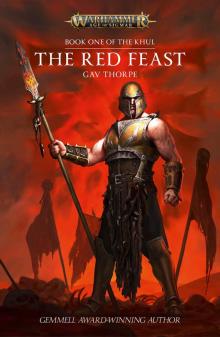 The Red Feast - Gav Thorpe
The Red Feast - Gav Thorpe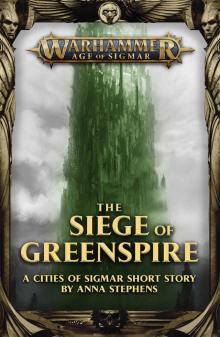 The Siege of Greenspire - Anna Stephens
The Siege of Greenspire - Anna Stephens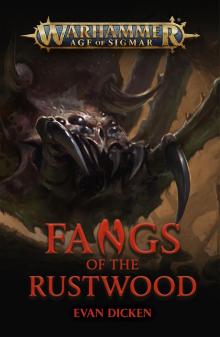 Fangs of the Rustwood - Evan Dicken
Fangs of the Rustwood - Evan Dicken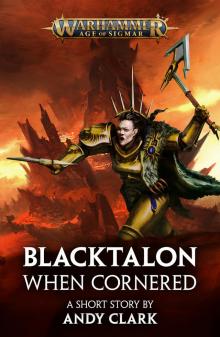 Blacktalon - When Cornered - Andy Clark
Blacktalon - When Cornered - Andy Clark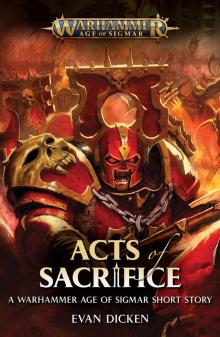 Acts of Sacrifice - Evan Dicken
Acts of Sacrifice - Evan Dicken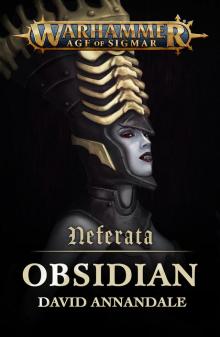 Obsidian - David Annandale
Obsidian - David Annandale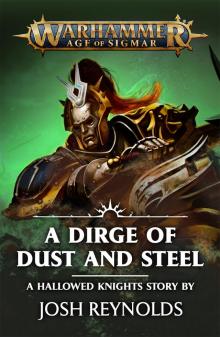 A Dirge of Dust and Steel - Josh Reynolds
A Dirge of Dust and Steel - Josh Reynolds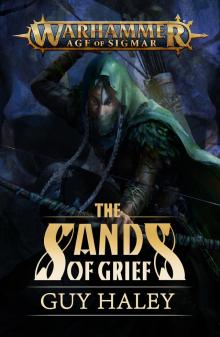 The Sands of Grief - Guy Haley
The Sands of Grief - Guy Haley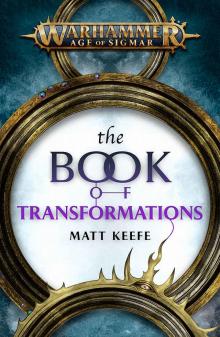 The Book of Transformations - Matt Keefe
The Book of Transformations - Matt Keefe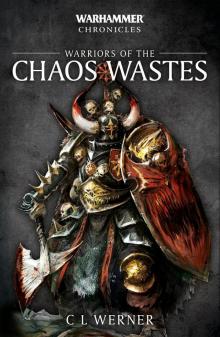 Warriors of the Chaos Wastes - C L Werner
Warriors of the Chaos Wastes - C L Werner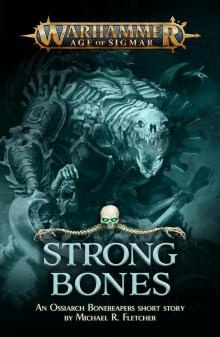 Strong Bones - Michael R Fletcher
Strong Bones - Michael R Fletcher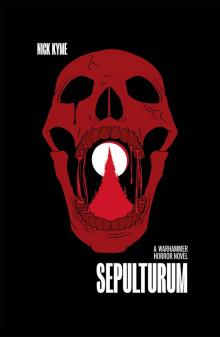 Sepulturum - Nick Kyme
Sepulturum - Nick Kyme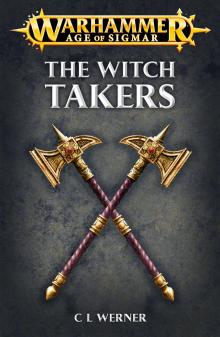 The Witch Takers - C L Werner
The Witch Takers - C L Werner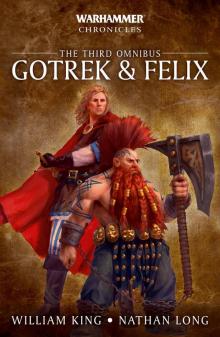 Gotrek & Felix- the Third Omnibus - William King & Nathan Long
Gotrek & Felix- the Third Omnibus - William King & Nathan Long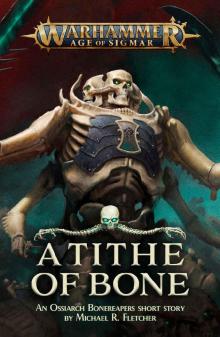 A Tithe of Bone - Michael R Fletcher
A Tithe of Bone - Michael R Fletcher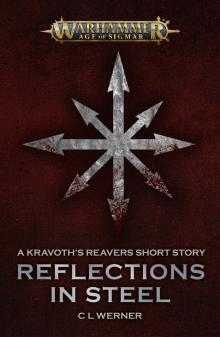 Reflections in Steel - C L Werner
Reflections in Steel - C L Werner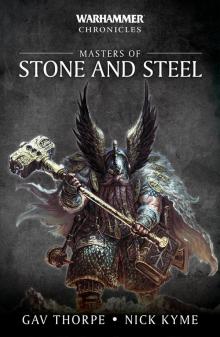 Masters of Stone and Steel - Gav Thorpe & Nick Kyme
Masters of Stone and Steel - Gav Thorpe & Nick Kyme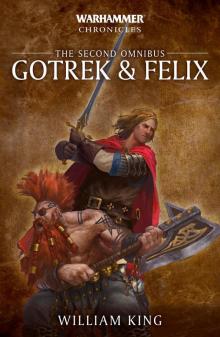 Gotrek & Felix- the Second Omnibus - William King
Gotrek & Felix- the Second Omnibus - William King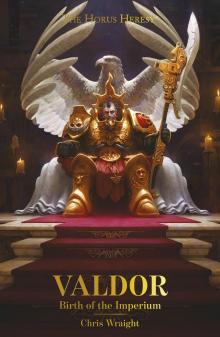 Valdor- Birth of the Imperium - Chris Wraight
Valdor- Birth of the Imperium - Chris Wraight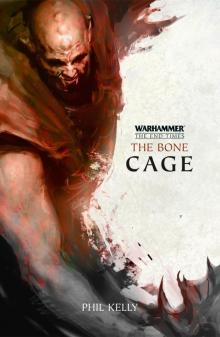 The Bone Cage - Phil Kelly
The Bone Cage - Phil Kelly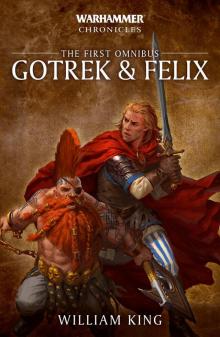 Gotrek & Felix- the First Omnibus - William King
Gotrek & Felix- the First Omnibus - William King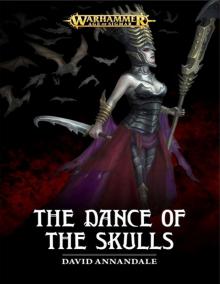 The Dance of Skulls - David Annandale
The Dance of Skulls - David Annandale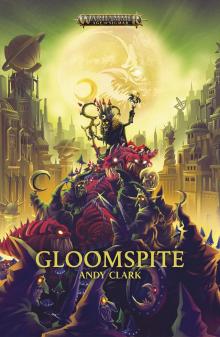 Gloomspite - Andy Clark
Gloomspite - Andy Clark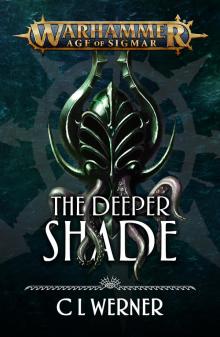 The Deeper Shade - C L Werner
The Deeper Shade - C L Werner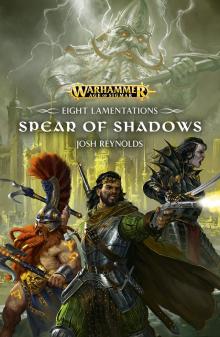 Spear of Shadows - Josh Reynolds
Spear of Shadows - Josh Reynolds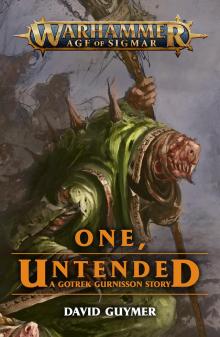 Gotrek - One, Untended - David Guymer
Gotrek - One, Untended - David Guymer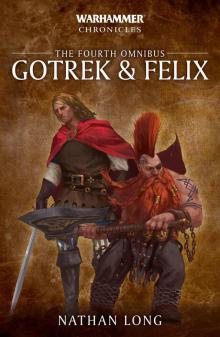 Gotrek & Felix- the Fourth Omnibus - Nathan Long
Gotrek & Felix- the Fourth Omnibus - Nathan Long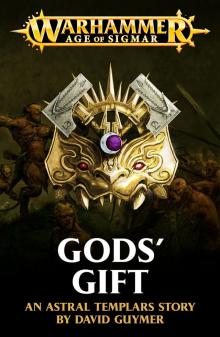 Gods' Gift - David Guymer
Gods' Gift - David Guymer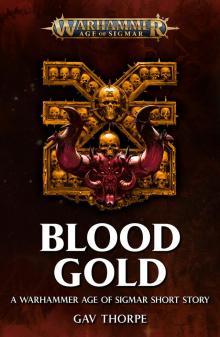 Blood Gold - Gav Thorpe
Blood Gold - Gav Thorpe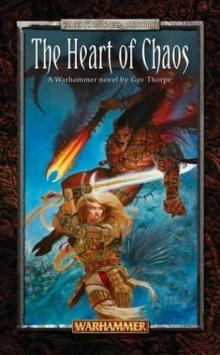 Slaves to Darkness 03 (The Heart of Chaos)
Slaves to Darkness 03 (The Heart of Chaos)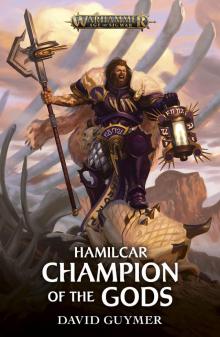 Hamilcar- Champion of the Gods - David Guymer
Hamilcar- Champion of the Gods - David Guymer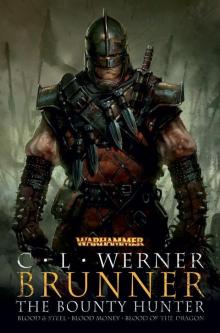 Brunner the Bounty Hunter (Blood And Steel)
Brunner the Bounty Hunter (Blood And Steel)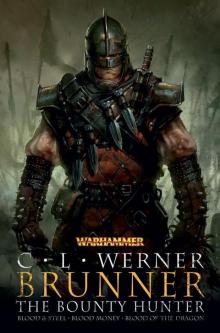 Brunner the Bounty Hunter (what price vengeance)
Brunner the Bounty Hunter (what price vengeance)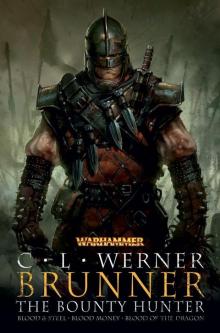 Brunner the Bounty Hunter (Blood of the Dragon)
Brunner the Bounty Hunter (Blood of the Dragon)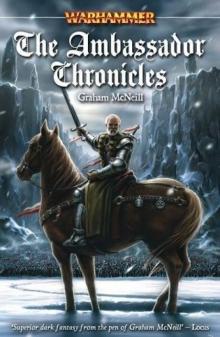 Ursuns Teeth
Ursuns Teeth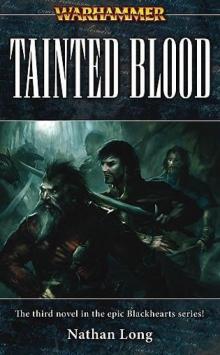 The Blackhearts Omnibus (Tainted Blood)
The Blackhearts Omnibus (Tainted Blood)![Daemon Gates Trilogy 01 [Day of the Daemon] Read online](http://i1.bookreadfree.com/i2/04/09/daemon_gates_trilogy_01_day_of_the_daemon_preview.jpg) Daemon Gates Trilogy 01 [Day of the Daemon]
Daemon Gates Trilogy 01 [Day of the Daemon]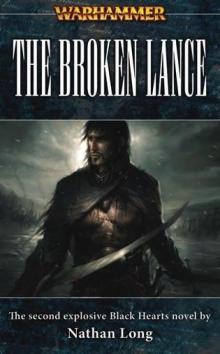 The Blackhearts Omnibus (The Broken Lance)
The Blackhearts Omnibus (The Broken Lance)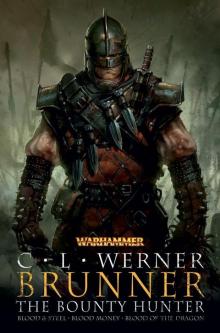 Brunner the Bounty Hunter (Blood Money)
Brunner the Bounty Hunter (Blood Money)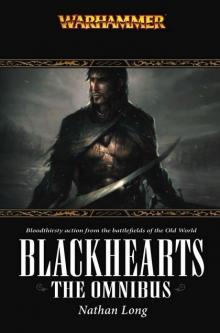 The Blackhearts Omnibus (Hetzaus Follies)
The Blackhearts Omnibus (Hetzaus Follies)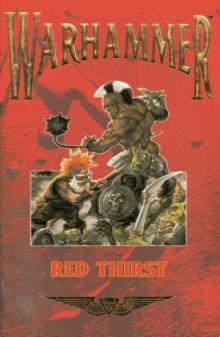 Warhammer Red Thirst
Warhammer Red Thirst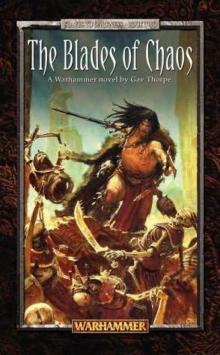 Slaves to Darkness 02 (The Blades of Chaos)
Slaves to Darkness 02 (The Blades of Chaos)